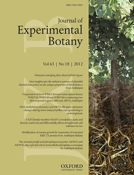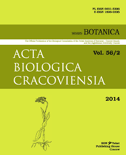
Nature Plants
Scope & Guideline
Advancing Plant Science for a Sustainable Future
Introduction
Aims and Scopes
- Plant Genetics and Genomics:
Research on the genetic basis of plant traits, including studies on genome sequencing, gene editing (such as CRISPR and prime editing), and the exploration of genetic diversity in crops and wild relatives. - Plant Physiology and Biochemistry:
Investigations into the biochemical processes within plants, including photosynthesis, stress responses, and metabolic pathways that contribute to growth and development. - Plant-Microbe Interactions:
Studies focusing on the interactions between plants and microorganisms, including beneficial symbionts and pathogens, and how these interactions influence plant health and productivity. - Ecology and Evolutionary Biology:
Research examining the ecological roles of plants, their evolutionary history, and responses to environmental changes, including climate change and habitat loss. - Agricultural Innovations and Crop Improvement:
Applied research aimed at improving crop yields and resilience through biotechnological methods, sustainable practices, and understanding plant traits that enhance agricultural productivity. - Plant Development and Morphogenesis:
Exploration of the developmental processes in plants, including cell differentiation, organ formation, and the genetic and environmental factors that influence these processes.
Trending and Emerging
- CRISPR and Genome Editing Technologies:
The application of CRISPR and other genome editing technologies is rapidly increasing. This includes studies focused on precise modifications to enhance crop traits, improve disease resistance, and facilitate research on plant biology. - Microbiome Research in Plants:
There is a growing interest in understanding the plant microbiome and its role in plant health and productivity, including how microbial communities influence disease resistance and nutrient uptake. - Climate Change Resilience and Adaptation:
Research addressing how plants adapt to climate change is trending, focusing on physiological, genetic, and ecological mechanisms that enhance resilience to stressors such as drought and heat. - Synthetic Biology and Plant Engineering:
The use of synthetic biology approaches to create novel traits in plants is gaining traction, with papers discussing engineered pathways and synthetic circuits that improve plant function. - Interdisciplinary Approaches Combining Plant Science with AI and Big Data:
The integration of artificial intelligence and big data analytics in plant science research is on the rise, facilitating advancements in precision agriculture, crop modeling, and trait prediction. - Plant Defense Mechanisms and Immune Responses:
Research into the molecular and genetic basis of plant defense mechanisms against biotic stresses, including pathogens and herbivores, is increasingly prominent, reflecting the importance of plant immunity.
Declining or Waning
- Traditional Breeding Techniques:
While traditional breeding methods were once a staple of agricultural research, the recent surge in genetic engineering and CRISPR technologies has overshadowed these methods. Studies focusing solely on conventional breeding practices are less frequent. - Basic Botanical Taxonomy and Classification:
Research dedicated to the classification and naming of plants has seen declining interest as the focus shifts towards functional genomics and ecological interactions, which provide more immediate applications in conservation and agriculture. - Historical Plant Uses and Ethnobotany:
Although important, studies centered on historical uses of plants and ethnobotanical knowledge are becoming less common, as contemporary research increasingly prioritizes genetic and biochemical approaches. - Soil Science and Plant Nutrition:
Research specifically focusing on soil chemistry and nutrition has diminished relative to studies that integrate these aspects into broader ecological and molecular frameworks. - Plant Pathology with Emphasis on Historical Disease Outbreaks:
Research concentrating on historical plant diseases is waning as the focus shifts towards understanding contemporary threats and developing modern disease resistance strategies through genetic approaches.
Similar Journals

aBIOTECH
Fostering collaboration for a thriving scientific community.aBIOTECH, published by SPRINGERNATURE, is a premier academic journal dedicated to advancing the fields of biotechnology, agronomy, and molecular biology. With an impressive ISSN of 2096-6326 and E-ISSN 2662-1738, this journal has established itself as a vital resource for researchers and professionals aiming to publish high-quality, impactful studies. Based in Singapore, aBIOTECH has achieved remarkable recognition, boasting a Q1 ranking in multiple categories including Agronomy and Crop Science, Biochemistry, and Genetics in the 2023 Scopus rankings. Its solid position in the 90th percentile for Biochemistry and Genetics reinforces its significance within the global scientific community. The journal covers a broad spectrum of topics relevant to both basic and applied research, facilitating a shared dialogue amongst scientists and encouraging collaborative progress in innovative biotechnological applications. The open-access nature of the journal ensures that cutting-edge research is freely available, fostering a global exchange of ideas that is critical to the advancement of science today.

JOURNAL OF EXPERIMENTAL BOTANY
Unraveling the mysteries of plant biology.JOURNAL OF EXPERIMENTAL BOTANY, published by Oxford University Press, stands as a premier journal for researchers and professionals in the fields of plant science and physiology. With an illustrious history dating back to 1950, this journal has established itself as a critical resource for advancing our understanding of plant biology and its applications. It is recognized in the top tier of academic publishing, reflected in its Q1 rankings in both Plant Science and Physiology for 2023, and boasts impressive Scopus rankings—placing it in the 96th and 91st percentiles of its respective categories. Though not an open-access journal, it ensures widespread access to groundbreaking research aimed at unraveling the complexities of plant functions and adaptations. As we look toward 2024, the JOURNAL OF EXPERIMENTAL BOTANY continues to play an essential role in fostering innovation, collaboration, and education within this vital area of science.

Journal of Integrative Plant Biology
Innovative Research, Global ImpactThe Journal of Integrative Plant Biology, published by WILEY, is a premier academic journal that has been at the forefront of advancing research in plant biology since its inception in 2005. With a notable impact factor and a robust Scopus ranking—positioned at #7 out of 516 in Plant Science and #18 out of 438 in Biochemistry—this journal is recognized as a Q1 journal in multiple categories, including Biochemistry and Plant Science. The journal aims to bridge the gaps between various disciplines in plant research, emphasizing integrative and interdisciplinary approaches to understanding plant biology. With options for open access, the Journal of Integrative Plant Biology ensures broad visibility and impact of research findings, making it an invaluable resource for researchers, professionals, and students looking to stay informed on innovative advancements in the field. Its headquarters are located in the United Kingdom, further amplifying its reach within the global academic community.

JOURNAL OF PLANT RESEARCH
Unlocking the Secrets of Plant Ecology and Agriculture.JOURNAL OF PLANT RESEARCH, published by SPRINGER JAPAN KK, is a leading academic journal that has carved a niche in the field of Plant Science. With its ISSN 0918-9440 and E-ISSN 1618-0860, this journal has been disseminating high-quality research since its inception in 1993 and continues to be essential reading for academics and practitioners alike, aiming to bridge the gap between innovative plant research and practical applications. The journal is highly regarded, holding a prestigious Q1 ranking in Plant Science for 2023, and is positioned in the top 80th percentile within the Scopus rankings for Agricultural and Biological Sciences. The journal's coverage includes a wealth of topics pertinent to advancing our understanding of plant biology, ecology, and sustainable agricultural practices. Although it operates under a subscription model, its influence in the research community remains profound, making it a vital resource for contemporary studies in plant-related disciplines.

BANGLADESH JOURNAL OF BOTANY
Unveiling the Secrets of Bangladesh's Plant LifeBANGLADESH JOURNAL OF BOTANY is a prominent publication in the field of plant sciences, dedicated to advancing research and knowledge within the botanical community. Published by the BANGLADESH BOTANICAL SOC, this journal serves as a vital platform for researchers and scholars seeking to disseminate their findings related to plant biology, ecology, and conservation practices, particularly within the unique context of Bangladesh's diverse flora. With an ISSN of 0253-5416 and an E-ISSN of 2079-9926, the journal encompasses a wide scope of topics, reflecting interdisciplinary approaches in botanical research. Since its inception, with convergence periods from 1996 to 2001 and from 2003 to 2024, it has garnered recognition, positioned in the Q4 category in the Plant Science field with a ranking of #459/516 in Scopus, indicating its contribution to the field despite its developing impact. Operating within Bangladesh, at the UNIV DACCA DEPT BOTANY, the journal provides a crucial insight into the ecological and agricultural implications of plant studies in the region, catering to the needs of academics, professionals, and students eager to engage with contemporary botanical research.

ACTA BIOLOGICA CRACOVIENSIA SERIES BOTANICA
Fostering a deeper understanding of our botanical heritage.ACTA BIOLOGICA CRACOVIENSIA SERIES BOTANICA is a distinguished journal published by the Polska Akademia Nauk (Polish Academy of Sciences), with its roots tracing back to 1996. As a pivotal publication in the field of Plant Science, it serves to disseminate high-quality research and findings, contributing to the ongoing development and understanding of biodiversity, plant ecology, and conservation. The journal is indexed under Scopus, ranked #203 out of 516 in its category, placing it in the 60th percentile and firmly within Q3 quartile for Plant Science in 2023. Researchers, professionals, and students will find invaluable content within its pages, enhancing their knowledge and supporting academic exploration. Although it currently does not offer open access options, the journal remains a crucial resource for those engaged in botanical sciences, with a commitment to advancing scholarship in Poland and beyond.

Egyptian Journal of Botany
Advancing botanical knowledge for a sustainable future.Egyptian Journal of Botany is a premier publication in the field of botanical sciences, encompassing agricultural research, plant biology, and ecology. Published by the NATL INFORMATION DOCUMENTATION CENT, ACAD SCIENTIFIC RESEARCH & TECHNOLOGY in Egypt, this journal has made significant strides since its establishment, now recognized within several prestigious Scopus quartiles including Q3 in Agronomy and Crop Science, and Q3 in Ecology, reflecting its impact and relevance in the scientific community. With an aim to disseminate high-quality research and foster innovation in plant sciences, the journal provides a platform for researchers, professionals, and students alike to share vital findings and advancements. Although it currently operates under traditional access, the wealth of knowledge it offers is pivotal for those engaged in ecological preservation, crop improvement, and biotechnological applications. With its comprehensive scope and evolving reputation, the Egyptian Journal of Botany is poised to remain an influential player in the botanical sciences from 2019 to 2024 and beyond.

Plant Science Today
Fostering breakthroughs in ecological and plant research.Plant Science Today is a prominent journal dedicated to advancing the field of plant sciences through innovative research and comprehensive reviews. Published by HORIZON E-PUBLISHING GROUP in India, this open-access journal has been actively disseminating knowledge since its inception in 2018, with a convergence period extending to 2024. With an ISSN of 2348-1900 and a growing reputation, it is categorized in various quartiles for 2023, notably achieving Q3 in Biochemistry, Genetics and Molecular Biology (miscellaneous), while it holds Q4 rankings in critical fields including Ecology and Plant Science. As a valuable resource for students, researchers, and professionals, Plant Science Today aims to inspire discussion and innovation in the realm of ecological and plant science disciplines, where it currently ranks within the lower percentiles in prominent categories such as Environmental Science and Agricultural and Biological Sciences. The journal serves as a crucial platform for the exploration of experimental and theoretical advances, fostering a community eager to explore plant biology's complexities.

Frontiers in Plant Science
Elevating plant science through open access and collaboration.Frontiers in Plant Science is a premier open-access journal dedicated to advancing the understanding of plant biology, covering a broad spectrum of topics including physiology, ecology, and biotechnology. Published by FRONTIERS MEDIA SA in Switzerland, this journal has established itself as a key resource in the field of plant science, boasting an impressive impact factor and ranking in the Q1 category for plant science as of 2023. With its Scopus rank of 61 out of 516 in both Agricultural and Biological Sciences, the journal is recognized for its quality and relevance, being in the 88th percentile among its peers. Since its inception in 2010, Frontiers in Plant Science has embraced an open-access format, ensuring that cutting-edge research is readily available to scientists, professionals, and educators around the globe. The journal aims to foster innovative research and collaboration within the plant science community, making it an essential publication for those looking to stay at the forefront of the discipline.

JOURNAL OF PLANT BIOCHEMISTRY AND BIOTECHNOLOGY
Nurturing Sustainable Practices through Plant Science ResearchJOURNAL OF PLANT BIOCHEMISTRY AND BIOTECHNOLOGY, published by SPRINGER INDIA, is a leading publication dedicated to advancing research in the fields of plant biochemistry, biotechnology, agronomy, and crop science. With an ISSN of 0971-7811 and E-ISSN 0974-1275, the journal encompasses a wide range of studies aimed at enhancing our understanding of plant biological processes and their applications in agriculture and biotechnology. It has achieved a noteworthy Q2 ranking in Agronomy and Crop Science and Plant Science, as well as a Q3 ranking in Biotechnology, reflecting its quality and relevance in contemporary research. Notably, the journal ranks #166 in Plant Science and #133 in Agronomy, both falling in the top 67th percentile. With a rich history spanning from 1992 to 2024, the journal is committed to providing open access to innovative research findings that bridge the gap between laboratory discoveries and their practical applications in sustainable agriculture. Researchers, professionals, and students will find a wealth of knowledge and inspiration to advance their work in the dynamic field of plant sciences at this esteemed journal.